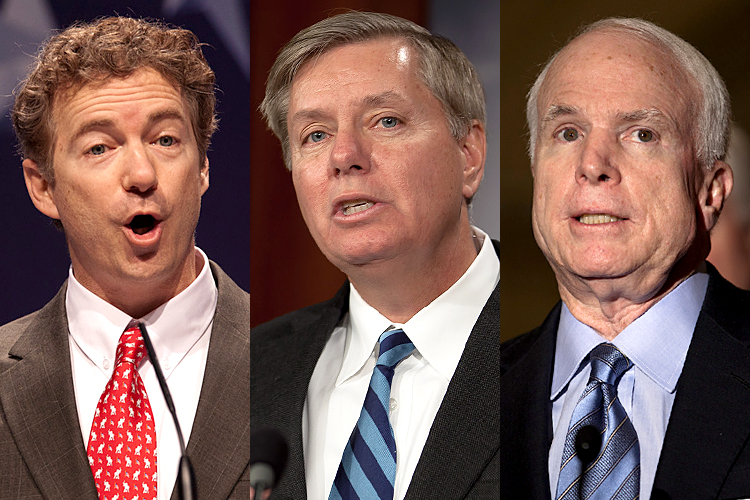
The Republicans have been raging a Civil War within it’s party since the fall, a short amount of time for a significant amount of fighting within the party to occur. However, the tea party is no weaker than it was before the infighting began, which hints to a stronger foundation than people think they have.
The infighting is far from over, the battle between the tea party and the establishment of the Republicans have started to see how much it’s truly going to take to out the party, as a whole, to get back to the position of power they were at previously. In a move of trying to one-up the tea party, the National Republican Senatorial Committee (hereon referred to as NRSC) threatened to “blacklist any consultant who does business with a key group taking on sitting.” Broken down, it basically means that it’s business as usual in the Republican party.
However, members of Congress are asking corporate America to pledge large sums of money to support candidates that agree to take on the tea party. Yes, this created interest within the party. But if you take a closer look, there still isn’t a concerted, cohesive effort to take on the core members of the party.
The problem isn’t the movement to take on the party itself, but instead it’s slow pace for taking it on and whether or not the candidates to take on the party are confident in doing so. The Republican party, as a whole, were eager to rise with the tea party in 2010 and were thrilled about the nearly unlimited fundraising that allowed outer establishments to thrive and churn out more candidates that are somewhat more willing to take on the establishment.
Republicans have an issue with the lack of cohesive targeting on the front of the tea party which ironically is, in many ways, the problem within the tea party. They spread their focus over several issues at one moment, then continuously shift the way they strategize on these points. There just doesn’t seem to be a strong focal point that has a certain base-idea within the party.
Essentially, this could spell its own downfall without external influences targeting the group at large. Concentrating on this concept, it leaves the party somewhat weaker to be diminished by the larger parties, but that might not be needed as the tea party struggles to find a strong candidate.
The GOP are fighting to take back control from the conservative activists. The goal: to leverage all of their strength behind the most probable candidates and take down those who get in their way. Chiefly, this means the tea party. The corporate world saved the GOP-backed Bradley Byrne for a House seat in Alabama. His candidacy is backed by the business community and the GOP and would weaken the established influence the tea party has. Even though this has been a slow-and-steady battle between the establishment and the tea party, it’s taken on a whole refreshed sense of urgency in the wake of Tuesday’s elections, especially as the midterm gets closer.
Republicans are arguing the fact that these elections are strengthening the point that candidates are important. This idea remains to be especially important seeing as the GOP must regain six seats in the Senate to take back the majority of power. If they fail to do this, the hope for the majority in future elections is much bleaker.
This type of combative politicking hasn’t yet been seen to work in the primaries, and it’ll continue to be an interesting battle between the Republicans and the tea party. The GOP populate a growing concern that picking fights with the activists could backfire and only further negatively affect the candidates they, as well as the larger corporations that pooled funding, backed up until this point. It becomes a slippery slope of unpredictable outcomes for the GOP constituents.
Spokesman for the NRSC, Brad Dayspring, said that the committee’s ultimate goal is to win the Senate (duh) and further make it a “more conservative, functional place.” But he voiced the fear that picking fights within the activists groups might impact that outcome.
GOP consultants are afraid that an effort to smother activists will fail because targeted activists see themselves firstly and chiefly as conservatives, not Republicans.
So far, efforts to “scare” the tea party, and furthermore activists, into line has not only failed, but also backfired. Its made them more weary of working with the GOP as a whole. Ultimately, the concern is misguided.
The GOP is running at candidates that aren’t sufficiently conservative, and that’s where their push should be — candidates that ring as strictly conservative if they want to save their party and have a concerted shot at the primaries. Historically speaking, it takes more than large sums of money for a candidate to win, even with a larger part of the business community in your pocket. Mitt Romney raised $992.5 million for his campaign and spent $992 million of it, whereas Barack Obama raised $1072.6 million and only spent $985.7 million of it; despite raising more money to thrown behind his candidacy, he spent less than Romney did and ended up winning the 2012 election.
While pooling money for ads and overall campaigning is vital to a party’s success, it doesn’t win an election — the candidate does.









